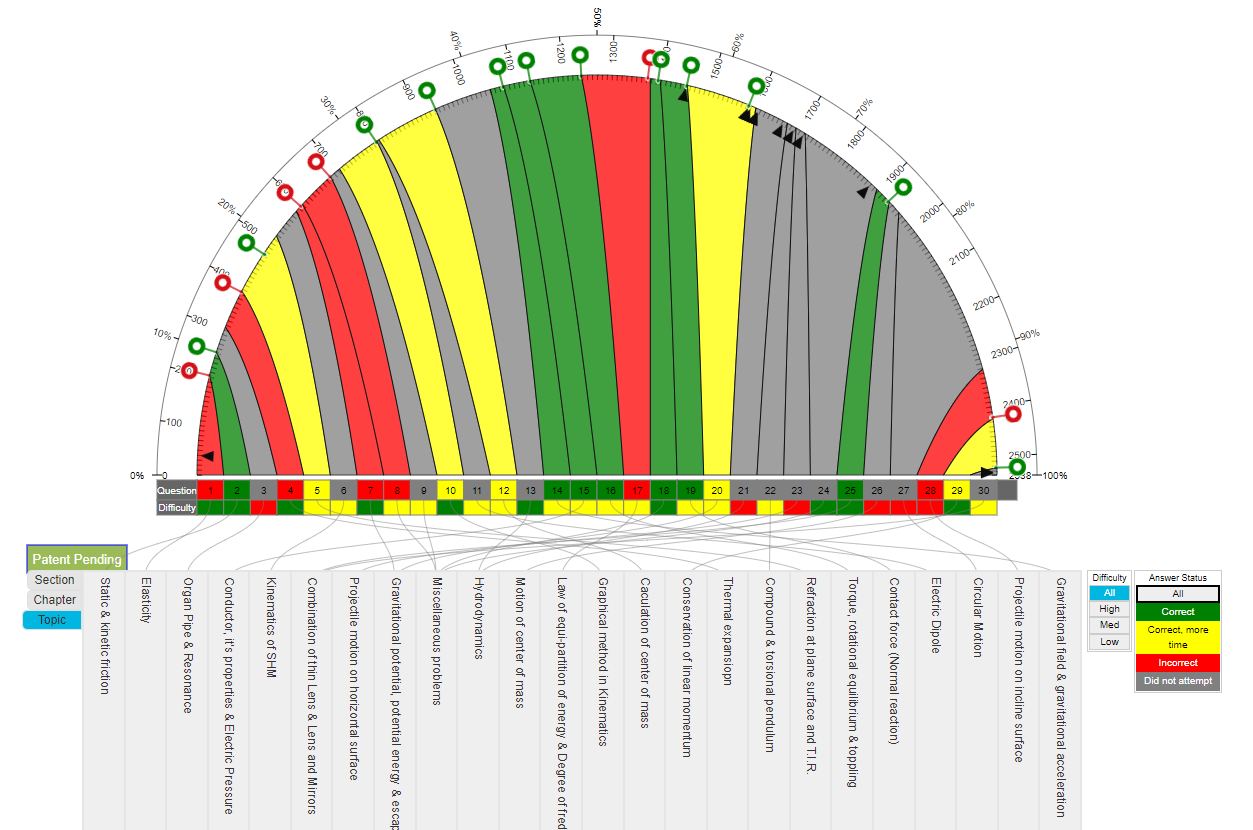Achieving Success in IIT-JEE & NEET in the Last 6 Months: Some Practical Tips

So, you finally realized that it’s only 6 months left for the JEE/NEET exams. Some of you must be having the following doubts – though you have been working hard, your marks aren’t reflecting the same, sometimes you go blank when solving the paper, forgot the previously read topics, whether to prepare for board or JEE, not getting enough time to revise as the syllabus is vast. But thankfully there’s still enough time to compensate previous lack of seriousness. You just need exalted study hours to dedicate to it, and a strong state of mind that is committed to overcoming every obstacle, so let’s pull up your socks and see how you can excel with proper plan and strategy.
Assuming that you already know the exam patterns and basic information about the exam. In case you don’t know the nuts and bolts of the exam you may check our blogs- All You Need to Know About IIT JEE 2023 (Main + Advanced) or NEET 2023: Do You Know Enough About It?. Let’s see what you can do in order to achieve success in JEE/NEET.
10 Tips to Crack IIT-JEE/NEET in the Last 6 Months
Below are some tips for students who are determined not to turn their preparation into a vain endeavor.
1. Proper Calm and Positive Mindset
This might sound insignificant and irrelevant to many students to speak about mindsets. But this is evident that students are more likely to give up inwardly thinking about the scarcity of time. This situation creates a huge psychological impact on the student and he/she becomes more vulnerable, frustrated, and depressed. Don’t let your mind play games with you. Only a calm mind can handle tempestuous situations.
Increase your vibrations/energy by reducing negativity and elevating positivity. One useful trick that we often suggest to our students is preventive taping. Remember how Shahid Kapoor advised Kareena Kapoor to take out her frustration/negative energy in the movie ‘Jab We Met’? Similar techniques we suggest along with taping specific acupressure points. Always keep your attitude appropriate and have a sense of gratitude. No, we are not any spiritual Baba who is teaching you spirituality. But it has been scientifically proved that Gratitude feeling is the highest form of vibration. Hence spend some time thanking your parents, friends, teachers, class, etc. whoever has been helping in your JEE/NEET journey.
You can divide your morning rituals as below. It won’t take more than 30 minutes.
- Cleanse the negative thoughts by preventive taping
- Write a gratitude
- Write/Give forgiveness
- Say strong affirmations, meaning say to yourself that “I can do it”, “I have the power”, etc.
- Once positive energy is high then do meditation
- Visualization- You need to realistically visualize the experience of scoring high in JEE/NEET, studying in your dream college IIT Mumbai, Friends/Relatives calling to congratulate you, etc.
And, in evening rituals:
- Again, cleanse the negative mindset by preventive taping
- Write down your victory log. Note what you planned in the morning and what you have achieved at the end of the day. This would build your confidence.
If you need any kind of assistance or you are facing a lack of motivation, you can contact us and we can help you out as we have done the same with many students before.
2. A Definitive Stringent Schedule
It is only 6 months and you are aspiring to score extremely high; hence there’s no way of laying lazy now. A typical plan may help, though it may vary from student to student. It would be best if you make your own routine. But for your ease, here’s an effective routine that was followed by Siddhant Jakhotiya (JEE Advanced 22, AIR 168, IIT Kanpur – CS). Even if you can’t follow this routine, at least try to follow the study durations.
| 6 – 6:45 am | Get up and drink warm water to renew up. Freshen up. Make it quick, and don’t sit around with negative thoughts. Follow the above morning rituals or Yoga or exercise to keep your energy/vibrations high. |
| 6:45 – 7 am | Milk/Tea. Pick up the pace, morning time is vital and you have previously dozed for right around 7-8 hours. |
| 7 – 9:15 am | Study time: Since the mind is charged up, do some Mathematical, Physics numerical, or difficult/new topics. |
| 9:15 – 9:30 am | Take a short break and have breakfast. Get prepared for the mock test. |
| 9:30 am – 12:30 pm | Solve some previous years’ questions on RAA JEE/NEET test platform. JEE Main paper will be at 9:30 am so set your biological clock by solving JEE paper at this time. |
| 12:30 – 12:45 pm | Lunch break: Eat lots of vegetables/beats/salad and less starch. |
| 12:45 – 2:15 pm | Check out the analysis provided by RAA JEE/NEET test platform. This time, try to learn new concepts and work on difficult problems. If you get stuck at something, note it down and try it the next day or ask your mentor. This will help you to manage time well and avoid time wastage due to mental blockages. |
| 2:15 – 2:45 pm | Take a power nap or simply unwind and revive the spell with music. |
| 2:45 – 4 pm | Study time – continue amending/tackling issues of those topics, which you learned at 12:45 pm or concentrate on a few previously arranged points |
| 4:00 – 4:15 pm | Take a snack break, have some Juice or Fruits |
| 4:15 – 5:30 pm | Study time – solve MCQs |
| 5:30 – 6 pm | Go out for a walk or play light sport |
| 6 – 7:30 pm | Study time as per the arrangement. Pick-up Chemistry/Biology |
| 7:30 – 8 pm | Dinner breaks quick light supper and 15 minutes of the night walk. |
| 8 – 9:30 pm | Study time: Revise some of the topics |
| 9:30 – 9:45 pm | Milk/Tea break |
| 9:45 – 11 pm | Take some intriguing subject, so you won’t nod off soon. Prepare a study plan for the next day. |
| 11 pm – 6 am | Sleep for 7 hours |
3. Use Pomodoro Study Technique
The Pomodoro Technique is focused on taking pauses after 45 minutes of study, which appears nearly contradictory. Let’s just break down this simple but effective study method.
- First of all, decide the topic that you want to focus on and arrange for a timer or simply put a clock in front of you.
- Set a timer for 25 minutes, and until the alarm goes off, concentrate only on that one thing.
- One Pomodoro will be done when your session is over, then note what you have accomplished.
- After that, take a five-minute pause.
- Thus, take a lengthier, more restorative pause of 15 to 30 minutes after repeating four Pomodoros.
Follow this technique and note how effective it is for you. If you need any kind of assistance, you can contact us and we can help you out.
4. Simple Maths to Crack JEE Main
Only speculations make it difficult. No matter how ordinary of a student you are, if you put your best effort forward, you will qualify for JEE Mains.
A JEE Main test is of 300 marks. It has 90 questions, out of which 75 questions you can attempt. Up to 9 of these questions are based on information from the 10th standard, while about 12 are taken straight from the 11th and 12th NCERT books. With these 21 (9+12) simple questions, you have a good chance of earning 84 (4 marks for each question; hence 21 X 4 = 84) marks and passing the JEE cutoff.By choosing these 21 simple issues, someone who has just focused on schoolwork can still achieve these 84 marks in the worst-case scenario. Every question in the 180-minute JEE Main test will receive 9 minutes (assuming an attempt of just 21 questions). Better planning would enable 10-15 more questions to be solved. Your grade will rise to around 140 points as a result. Students can strive for 250, and occasionally even 300, with the right preparation, diligent review, and several practice exams!
5. Utilizing Proper Resources
Make an effort to utilize books that you already read. Any new book, however, will be confusing because it will be challenging to find the appropriate page. Even if you haven’t begun reading it yet, NCERT chemistry is a required text. The lab manual and practical notebooks should also be completely filled out because JEE Main involves a lot of experimentation. We offer notes at Rathi’s Aspire Academy that are crucial for the exam and can aid students in scoring well.
Avoid unnecessary study on a certain subject. For instance, JEE doesn’t ask questions on relativistic charge particles in electrodynamics to assess your understanding of “Einstein’s theory of relativity.” However, many students spend their valuable preparation time delving into these unimportant minutiae, which not only results in time loss but also throws their thought processes off.
6. Tight Hold of Syllabus
Not only completing the syllabus but also having a crystal-clear concept of the topics covered in the syllabus is as common as anything. Your syllabus and textbooks are your prime source and complete them as fast as possible. Because only textbooks won’t help. You have to go far beyond to crack a competitive exam like JEE/NEET with a higher ranking.
Everyone will suggest mock tests, previous year papers, consistency, and whatnot. But they miss the most fundamental thing, the core syllabus and assigned textbooks for that. Undoubtedly other things (e.g., mock tests, previous year papers) are of much importance, but let’s not compromise the syllabus and board study for those.
The student who made it to IITs, and NITs were also unable to finish the entire syllabus thoroughly. Hence you can smartly choose the topics and qualify for JEE Main. Pick a topic on which there are multiple dependent topics. Ex In Physics picks Electrostatics instead of Optics. Here we aren’t trying to downplay the importance of preparing for the entire syllabus, but we are sharing the strategies to score maximum in minimum time.
7. Prioritize PYP & Smart Revision
Previous year papers (PYP) are inevitable; you must solve those. Many students lose confidence when they encounter a few odd challenges related to a subject in a book. However, they are competent in tackling JEE/NEET issues from past years. Regularly attempt all JEE/NEET questions from past years to better understand the difficulty level and question kinds. Also, give RAA topic-wise and chapter-wise tests. It is an amalgamation of very high-quality questions designed and picked up by IITians and Doctorate faculties.
Revision – When you read any subject/topic for the first time, you should read it thoroughly. Obviously, it will be followed by solving questions/tests on that topic. You should categorize (use sign, legend) the questions which you were able to 1. Solve easily, 2. Struggled a bit and took time and 3. you had to consult your mentor. So, when you do the revision, you can skip the questions which you were able to solve easily. During revision also mark those questions again using the same technique. This way you can save the time required for the revision.
8. RAA State of the Art: JEE/NEET Testing Platform
When you are preparing for JEE/NEET, no shortcut will work, and the inevitable part of it is taking several mock tests and solve last year papers to visualize the exam and get a better understanding. But since the time is limited and you have to cover a lot, it’s waste of time to evaluate your own answer papers. Moreover, you may not point out each and every error on your own.
That’s where RAA come into the play. Rathi’s Aspire Academy has unique software that our students can access. This software is capable of evaluating each and every minute detail that is extremely exhausting and almost impossible for a human being to figure out. This is the testing platform that we use for our students. Our top students consistently emphasized and recommended RAA’s testing platforms for JEE/NEET candidates.
Below is a screenshot of a granular level analysis provided by our software.

This testing platform enables the students to view their mistakes, weak areas, strong areas, right and wrong answers, time consumed for a specific question, time taken by you vs. other students, difficulty level of questions, chapters they need to focus on, and many other analysis. Both parents and students will have an access to this analysis, needless to say that we will be there at every step to guide you through, formulate strategies for you and work on your weak area.
9. How to prepare for Board and JEE/NEET Simultaneously
Board test preparation and JEE/NEET can coexist; you simply need to carefully time them.
First, limit yourself to issues relevant to the 12th grade. Pick a subject and wrap it up from the viewpoint of the board. Solve a couple of JEE/NEET questions from the recently completed topic before moving on to the next one. In this manner, you will adequately prepare for the board exam while still maintaining JEE/NEET.
Few students base their Board test preparation on the last two to three weeks. If you have previously achieved a Pre-board score of roughly 80% and are really certain about the board, it is fine. Otherwise, at least begin your board preparation three to four months in advance. At RAA, we prepare and evaluate students for the board since the beginning of 11th std. Starting board preparation, a bit earlier has the following benefits:
- You may take Pre-board examinations with confidence, and a good result there will increase your self-assurance. Ideally, the students who give RAA Pre-board test series, can expect 5–10% higher scores on the board than the Pre-board score.
- By tackling a few everyday topics, you continue to be involved in JEE/NEET preparation even just before the board.
- If you find that there is not enough time to prepare for both the board exam and JEE at the same time, you can simply stop preparing for JEE and focus solely on the board exam as you will need 75% in the board to be eligible for JEE/NEET. For JEE you would get 2nd attempt but for the board, you won’t.
10. Smart Trade-Off
- Read from books that you referred to before instead of referring to new books in the last 2-3 months
- If you are short of time then focus more on the theoretical type of questions rather than numerical
- If you think you won’t get 75% on the board then you better focus on the board rather than JEE Main attempt 1. You will get 2nd attempt for JEE Main.
- Don’t run behind to finish the remaining topics, better ensure whatever you have finished so far, you can solve all sorts of questions on those topics.
- Physics, Chemistry, and Maths have equal weightage/marks in JEE Main. Chemistry has maximum theory questions; hence it will boost your score. If you don’t like Chemistry then develop an interest in it as it will help you get a good score in JEE Main.
Something More…
Here are some more bonus tips for you:
- Don’t follow generic plans since you are the best one to choose how your study should be conducted. Adjust the JEE Main preparation in 6 months strategy to your needs instead.
- In contrast with others not at all. It won’t do anything and will probably make you less motivated.
- If you enjoy interacting with others, consider studying in groups with friends who share your commitment to passing the JEE/NEET exam.
- Do not disclose your study schedule or plans with anybody other than your professors or a senior who is assisting you in your preparation.
- Don’t put things off. Do what has to be done and finish the schedule in accordance with the JEE/NEET preparation timetable.
- If you spend the last six months you have well, you will have plenty of time. So, let’s get going!
- Read our blog on Important tips for IIT-JEE/NEET in the last few weeks
Finally
The last few months before JEE/NEET are extremely important and demand professional assistance. Keep in touch with your mentors; they may provide you with many important and specific pieces of advice that will help you achieve higher scores. Always keep in mind that we are here to assist you in getting over any difficulties; don’t hesitate to call us if you get stuck on anything.
Rathi’s Aspire Academy hosts a variety of seminars from JEE/NEET toppers that will give you advice on how to pass the IIT-JEE test. However, if you are stuck at any point, you can seek our help beyond any hesitation. RAA’s prime motive is to facilitate students, and we’ll stretch out limits for this to the best of our capabilities. We wish you good luck for your JEE/NEET exam.



